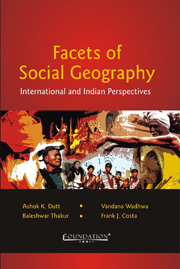Book contents
- Frontmatter
- Contents
- Foreword
- Preface
- Acknowledgements
- List of Contributors
- I Introductory Framework: Allen G. Noble's Contribution to Social Geography
- II Conceptual and Theoretical Basis of Social Geography
- III Social Geography from a Global Perspective
- IV Social Geography in the Indian Context
- 15 Socio-cultural Regions in Pre-historic and Historic India
- 16 Distinct Regional Cultural Identities of India Based on Religion and Language
- 17 Linguistic Diversity Changes in India: A Regional Analysis, 1971–2001
- 18 The Geography of Folk Art in India
- 19 Indian Dance: Classical Unity and Regional Variation
- 20 Space, Gender and Social Value: Analyzing Gender Inequalities in Relation to Space
- 21 Encountering Reservation and the Reimagining of Caste
- 22 Spatial Patterns of Crime in India
- 23 Rural Human Resource Development in India: A Spatio-Temporal Analysis
- V Indian Social Geography: City and State Context
- Index
20 - Space, Gender and Social Value: Analyzing Gender Inequalities in Relation to Space
from IV - Social Geography in the Indian Context
Published online by Cambridge University Press: 05 June 2012
- Frontmatter
- Contents
- Foreword
- Preface
- Acknowledgements
- List of Contributors
- I Introductory Framework: Allen G. Noble's Contribution to Social Geography
- II Conceptual and Theoretical Basis of Social Geography
- III Social Geography from a Global Perspective
- IV Social Geography in the Indian Context
- 15 Socio-cultural Regions in Pre-historic and Historic India
- 16 Distinct Regional Cultural Identities of India Based on Religion and Language
- 17 Linguistic Diversity Changes in India: A Regional Analysis, 1971–2001
- 18 The Geography of Folk Art in India
- 19 Indian Dance: Classical Unity and Regional Variation
- 20 Space, Gender and Social Value: Analyzing Gender Inequalities in Relation to Space
- 21 Encountering Reservation and the Reimagining of Caste
- 22 Spatial Patterns of Crime in India
- 23 Rural Human Resource Development in India: A Spatio-Temporal Analysis
- V Indian Social Geography: City and State Context
- Index
Summary
The role of space in creating and sustaining gender roles and gender inequalities is a subject that needs further interrogation, particularly within the richly diverse Indian context. Drawn from the author's doctoral work, this paper is an attempt to examine the question of gender inequality in terms of gender disparities in social well-being. The role of space and region in creating and sustaining these inequalities is interrogated through fieldwork in two physically and socio-culturally dissimilar regions. The paper is divided into four sections. Section 1 briefly describes the framework of the analysis. Section 2 describes the social and physical spaces within which this analysis is located. The results of the study are presented in Section 3. Section 4 is the concluding section where an attempt at theorization is made.
Analysing Gender Inequalities in Relation to Space
While it has become fashionable and politically correct to address the question of gender inequality (however fleetingly) in academic discourse as well as in grassroots activism, there is an urgent need to locate it firmly within a valid framework of analysis. To begin with, it is erroneous to address the question of gender inequality in isolation from the social– spatial context that it appears in. Academic discourse cannot produce meaningful explanations if such issues are taken out of the total societal context and addressed in isolation. Secondly, reality differs over space and time. Situations are comparable only where geographical and economic realities are similar.
- Type
- Chapter
- Information
- Facets of Social GeographyInternational and Indian Perspectives, pp. 382 - 399Publisher: Foundation BooksPrint publication year: 2012
- 1
- Cited by



